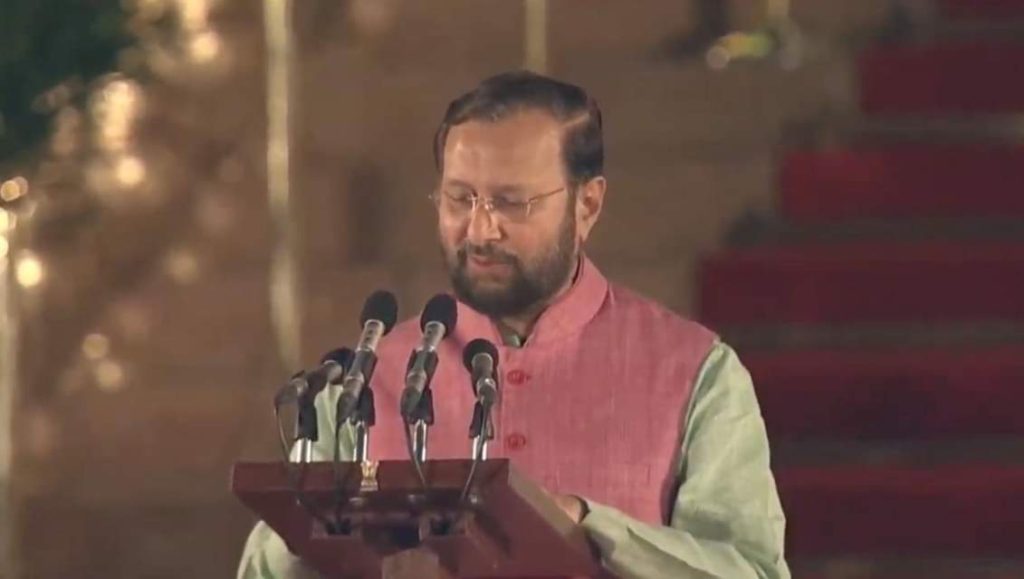Prakash Javadekar joins PM Narendra Modi’s cabinet

Pune : Prakash Keshav Javadekar (b. 1951), who was Minister of Human Resource Development, Government of India in the previous government, took oath as a Union Cabinet Minister today, May 30, 2019 in Narendra Modi-led NDA Government’s second term. He was elevated as a Cabinet Minister on July 5, 2016 and assigned the HRD portfolio. He was first inducted into the Council of Ministers led by Prime Minister Narendra Modi on May 26, 2014 as Minister of State (Independent Charge) for Environment, Forest & Climate Change and Ministry of Information & Broadcasting. Additionally, he also worked as a Minister of State for Parliamentary Affairs until November 9, 2014. He continued and concentrated thereafter as MoS (IC) of Environment, Forest and Climate Change until July 5, 2016.
He is a member of Rajya Sabha (Council of States) representing Maharashtra Since April 2018 (Third Term). In his second term as a member of Rajya Sabha represented the state of Madhya Pradesh from June 2014 to March 2018. Javadekar was first elected to Rajya Sabha from Maharashtra in May, 2008. He had served with distinction in Parliamentary Standing Committees of Defence, HRD and Consultative Committee of Power. He was also member of Committees on Paper Laid and Subordinate Legislation.
Javadekar was born to Keshav Krishna Javadekar and Smt. Rajani Javadekar on January 30, 1951 in Pune. His father, was a journalist working with ‘Kesari’, a Marathi newspaper founded by Lokamanya Tilak. His mother is a retired primary school teacher. He pursued schooling from Ist to IXth standard in Maharashtra’s Raigarh District in a Tehsil Town of Mahad in Zilla Parishad school and government aided High School. Javadekar got associated with Rashtriya Swayamsevak Sangh (RSS) right from his school days in Mahad.
He later joined Akhil Bharatiya Vidyarthi Parishad (ABVP) in 1969 that proved a stepping stone to public life, while he was pursuing graduation from M.E.S. College of Commerce in Pune. Renowned Professor of History Shreepati Shastri and RSS Pracharak Damu Anna Date played a major role in shaping his political thinking. During this period he led various students agitations and was elected to the Senate of the Pune University from the Graduate Constituency in 1975. In 1972, he was Secretary of a Committee of students to felicitate Jaiprakash Narain under the leadership of Gopinath Munde. Prof. Yashwantrao Kelkar and Prof. Bal Apte guided him through his ABVP days.
He served in Bank of Maharashtra between 1971 and 1981. He continued to remain active in student movement even during his Bank tenure. When emergency was clamped by the Congress regime in 1975, he became more active in organising protests. ABVP organised Satyagraha in 11 colleges on 11 December at 11 a.m. in Pune. Prakash Javadekar as a student leader and member of the Senate offered Satyagraha in Pune University premises and was arrested. Later he was put in Yerwada Jail, first under preventive detention, in which he was sentenced for 3 months and later under MISA (Maintenance of Internal Security Act) for over 13 months. In jail he used to bring out a weekly wall paper titled ‘Nirbhay’ which became very popular among the 400-odd political prisoners. He also organised various programmes along with his colleagues inside the jail. He was deeply influenced by the then RSS Chief Shri Balasaheb Devras, who was also detained in Yerwada Jail.
He married Prachee, who was also an ABVP activist, in December 1977. She was also jailed for opposing Emergency. After coming out of jail, Prakash Javadekar wholeheartedly campaigned for the Parliamentary Polls in Pune City from where Mohan Dharia was the Janta Party candidate.
Between 1978 and 1980, he worked on a tribal project of Bank of Maharashtra in Manor, Tehsil Palghar, District Thane. Later he worked in Sick Unit Cell & Employment Promotion Programme for Bank of Maharashtra, he was member of the Youth Welfare Board of Government of Maharashtra during this period and started informally working for the Janata Party.
He resigned from Bank of Maharashtra in 1981 and started working as a full-time worker of Bharatiya Janata Party (BJP). He was assigned the responsibility of General Secretary, Bharatiya Janta Yuva Morch (BJYM). He worked relentlessly in the State of Maharashtra and in the subsequent year was made the Member of National Executive of BJYM and National Convenor of Unemployment Cell of BJYM. He wrote extensively on the issues relating to unemployment and organised various protests in the State and at the national level on the issue of unemployment. He spearheaded ‘Sangarsha Rath’ throughout Maharashtra and mobilised thousands of youth in Mumbai on March 10, 1989. This was the first of its kind ‘Rath’ deployed by the BJYM/BJP. He was later elevated as All India Secretary and General Secretary of BJYM under the leadrship of Kalraj Mishra, Satyadev Singh, Pramod Mahajan and Rajnath Singh. He was part of each of the programme of young political leaders (ACYPL) to USA in 1985.
He was elected to the Maharashtra Legislative Council from Pune Region Graduate Constituency in June 1990. Got re-elected in 1996 and continued till 2002. During this period, he was actively raising issues of criminalisation of politics and corruption within and outside the House. He was also given the responsibility of a Spokesperson of BJP, Maharashtra. He was also acting as Chief of Publicity Wing of State BJP and he produced six very popular docu-dramas, films for various elections.
He was Executive Chairman of the State Planning Board, Maharashtra between 1995 and 1999. This Planning Board was instrumental in chalking out the IXth Five-Year Plan of the State. He was also appointed as Chairman of the State IT Task Force and submitted various reports and initiated vigorous computerisation and citizen-friendly IT applications in the State. He was appointed as the Chairman of the Working Group on “IT for Masses” by Government of India and successfully negotiated MIT Media Lab Asia project.
In 2003, he was appointed as BJP’s National Spokesperson and started his political stint in Delhi. He continued as a BJP Spokesperson until 2014. He approached his work as Spokesperson in a very professional and scientific manner. He promoted research and multiple inputs, while articulating party’s stance.
Key initiatives taken by Javadekar
As HRD Minister
Please click the link for details:
http://www.prakashjavadekar.com/wp-content/uploads/2019/03/Ministry-of-HRD-Brochure-04_06_2018-English.pdf
As Minister of State for Information & Broadcasting
► Initiated process for launching ‘Kisan Channel’
► Initiated process for expanding ‘FM’ reach and its second auction
► Brought transparency in the allocation of licenses to TV channels
► Took various steps to strengthen Social Media outreach of the Government
As Minister of State for Parliamentary Affairs
► Worked under the leadership of Shri Venkaiah Naidu for the smooth sailing of proceeding in the Rajya Sabha
► Actively coordinated with the leaders of all political parties represented in RS
As Minister of State (IC) for Environment, Forest and Climate Change
► Took various initiatives to increase forest cover. Introduced CAMPA Bill in Parliament to release Rs 42,000 crore for afforestation
► Ensured transparency in the process of granting Environmental Approvals and introduced the concept of “Ease of Doing Responsible Business”
► Effectively put up India’s case in Paris and played a pro-active role in the success of Paris Summit on Climate Change
► Revamped Five Waste Management Rules – Solid, Plastic, Hazardous, Electronic and Bio-medical. Brought in for the first time Construction and Demolition Waste Management Rules
► Introduced comprehensive National Air Quality Index and raised pollution benchmarks for industries and also started 24×7 pollution monitoring mechanism
► More than 400, Eco-Sensitive Zones finalised





